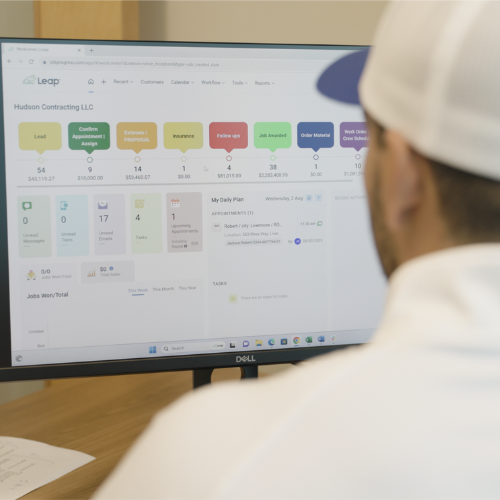Running a roofing business requires expertise, organization, and a customer-focused approach. In fact, effective roofing business management ensures smoother operations, higher profits, and satisfied customers.
In this guide, we’ll break down the roofing industry and provide the top strategies for managing your business successfully. When your systems and processes work together, you can create a sustainable business that grows its customer base, provides great craftsmanship, and becomes an industry leader in the community.

Overview of the Roofing Industry
The roofing industry is both competitive and rewarding. Homeowners rely on roofing contractors to protect and enhance their homes. Roof replacement, repair, and maintenance remain in high demand across the nation.
Seasonal changes often drive the need for these services, with busy periods occurring after storms or during warmer months. Moreover, roofing businesses often face challenges such as fluctuating material costs, high competition, and workforce shortages.
Proper roofing business management can help navigate these challenges and drive sustainable growth. And successful contractors will adapt to market trends, invest in technology, and prioritize customer satisfaction.
Modern customers expect professional services, clear communication, and timely project completion. Meeting these expectations requires well-organized roofing workflows and a focus on delivering value. Contractors must also handle complex processes like estimating, scheduling, and invoicing. Using the right strategies and tools makes managing these tasks easier and more effective.
10 Best Roofing Business Management Strategies to Consider
Managing a roofing business effectively requires a combination of skills, tools, communication, and processes. For example, the top roofing business management strategies to ensure success are:
- Streamline Hiring, Training, and Onboarding
- Estimate Jobs Accurately
- Focus on the Customer Experience
- Invest in CRM Software
- Offer Competitive Pricing
- Utilize Consistent Financial Tracking and Data Reporting
- Customize Your Workflow for Each Job
- Maximize Marketing and Lead Generation Efforts
- Prioritize Scheduling and Time Management
- Expand Your Services and Prepare for Seasonality
It’s important to create a seamless experience from the first contact with a lead to the sales process and production. This is a clear-cut way to build trust with homeowners, win more jobs, and leave a lasting impression with your work.
So, let’s take a closer look at each of these strategies. This will help you determine areas for improvement in your business that can make all the difference in your success.
1. Streamline Hiring, Training, and Onboarding
Your team is the backbone of your business. That’s why you need to hire skilled workers who match your company culture. Provide thorough training to ensure safety, efficiency, and quality.
Develop a standardized onboarding process for new employees. This ensures consistency and reduces the time it takes for new hires to become productive. A strong workforce sets the foundation for long-term success.
2. Estimate Jobs Accurately
Accurate estimates build trust and protect your bottom line. Include labor, materials, and overhead in every quote. Use tools like roofing software to minimize errors and save time. This is one roofing business management strategy you can’t overlook.
Clear and detailed estimates help customers understand costs. In addition, transparent pricing prevents misunderstandings during the project.
3. Focus on the Customer Experience
Happy customers bring repeat business and referrals. Therefore, communicate clearly from the first contact to project completion. Address questions quickly and ensure the customer understands the process.
After finishing a job, follow up to confirm satisfaction. A great customer experience builds your reputation and leads to long-term growth and reputation management.
4. Invest in CRM Software
Customer Relationship Management (CRM) software simplifies many aspects of your business. Use it to track leads, manage projects, and store customer data.
CRM software also improves communication by centralizing information. Investing in CRM ensures better organization and higher efficiency.
When you create a seamless flow of information throughout your business, your entire staff will be on the same page. This gives you the chance to take on more work and increase your profits.
5. Offer Competitive Pricing
Roofing business management requires you to create a culture of continuous improvement. You need to research your market to stay competitive.
Offering fair prices while maintaining profitability is key. Use pricing strategies that reflect your expertise and the value you provide.
Competitive pricing doesn’t mean being the cheapest. In general, it’s putting a focus on delivering quality and highlighting your unique selling points.
6. Utilize Consistent Financing Tracking and Data Reporting
Track finances carefully to ensure profitability. Overall, this is the best way to protect your business.
Use software to monitor expenses, revenue, and profit margins. Regular reporting helps you identify trends and make informed decisions.
Accurate data reporting also improves transparency with stakeholders. Clear financial tracking supports sustainable business growth. Now you can see what’s working throughout the year and where you need to improve.
7. Customize Workflow for Each Job
Every roofing project is unique. Customize workflows to meet specific project requirements. This includes scheduling, assigning tasks, and managing materials.
Adaptable workflows ensure efficiency and prevent delays. They also help address unexpected challenges in roofing business management.
8. Maximize Marketing and Lead Generation Efforts
Effective marketing drives leads and grows your customer base. Use a mix of strategies, including advertising, SEO, social media, and local partnerships.
Track which campaigns bring the best results. That way, you can focus on strategies that target your ideal customers and convert leads into customers.
9. Prioritize Scheduling and Time Management
Efficient scheduling minimizes downtime and maximizes productivity. Use scheduling tools to plan jobs, assign tasks, and allocate resources effectively.
Good roofing business management ensures projects finish on schedule. And this really comes down to time management. When you are on time and on budget, customer satisfaction improves and gives your company’s reputation a boost.
10. Expand Your Services and Prepare for Seasonality
Offering diverse services attracts more customers and protects your business from seasonality concerns. Add related services like gutter installation, skylight repair, attic insulation, siding, or solar.
Plan for seasonal fluctuations by promoting preventive maintenance during slow periods. Expanding your services and preparing for seasonality keeps your business profitable year-round.
How Leap CRM Can Help You Run Your Roofing Business
Leap CRM offers a complete management solution for roofing contractors looking to scale their business. It will transform the way you work with features that simplify workflows, improve communication, and automate repetitive tasks.
Leap CRM centralizes all your data, making it easy to track leads, create estimates, and manage projects efficiently. Moreover, Leap provides partner integrations with tools and systems such as measurement tools, financing lenders, manufacturers, suppliers, and more.
By investing in Leap CRM, roofers gain better control over their business processes. It reduces errors, saves time, and enhances the customer experience. This results in higher efficiency, improved customer satisfaction, and steady growth.
It’s clear that roofing business management requires the right strategies and tools. And Leap CRM is a valuable partner in helping roofers streamline operations and achieve long-term success. To see for yourself, fill out the form below and schedule a quick demo!




